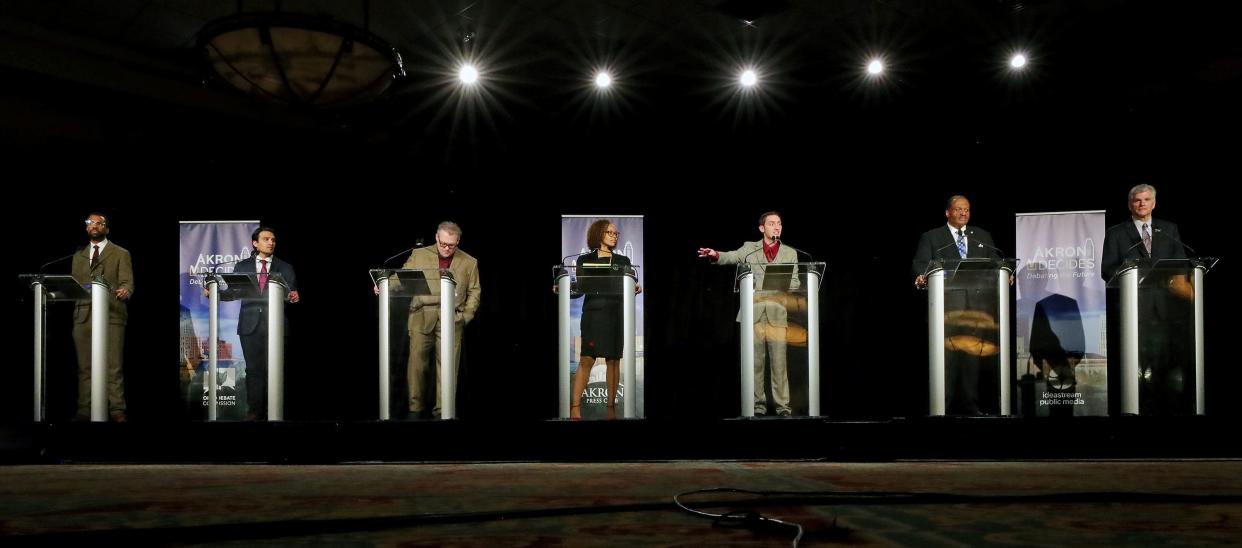Akron needs nonpartisan elections to engage more voters

(This opinion article represents the collective viewpoint of the Akron Beacon Journal’s Editorial Board, which includes two editors and four community members.)
The next mayor of Akron will likely win the job with less than 30% of the Democratic vote some seven months before he or she will take office for a four-year term.
Absent a last-minute independent candidate, Republican and independent voters will have no say in the matter unless they take a Democratic ballot in the May 2 primary when turnout always is lower.
That's not democracy.
Now, imagine a scenario where the top two of the seven Democratic candidates were forced to campaign for the November general election.
Who to vote for? Summit County Voter Guide has candidate information in their own words
The possibilities among the five top candidates — Mark Greer, Shammas Malik, Tara Mosley, Marco Sommerville and Jeff Wilhite — are intriguing and would challenge the candidates to appeal to all voters, not just Democrats. A longer, more rigorous campaign would be an excellent test of their ability to succeed in a very difficult job.
Akron's current reality is not unusual in a one-party town where Republicans have not presented a strong mayor contender since 1983 when incumbent Roy Ray lost. Nor is it unusual in many local elections across Ohio, including smaller Republican-leaning cities, where primary elections also serve as the public's final vote on office holders.
The solution? Let's end partisan elections in Akron and other cities where political diversity is a memory.
A mayor's ability to lead means much more than their political affiliation at the local level. Democrats don't have a better plan than Republicans for plowing snow. A good leader does.
Nor do all Democrats or Republicans agree on all issues or offer the same vision for our future. That reality has been clear throughout the current mayor race.
For Akron City Council's ward races, the same top-two scenario would work in the primary, while the council-at-larger primary could produce six top candidates for three contested seats in November.
There's also an argument to be made for so-called "top-two primaries" in state-level races, many of which are lopsided, gerrymandered contests across Ohio at the legislative level. Would such races attract more moderate candidates or campaign positions if the November candidates could both be Republicans or Democrats?
Why did my Summit polling place change?: Everything to know about May 2 election
Jim Renacci's recent guest column calling for closed primaries where only voters previously declared for one party can vote reminded us of how misguided many political leaders have become. They view their entitled parties as the solution when in reality both parties do more harm than good these days.
President George Washington wisely counseled his nation of these dangers in 1796.
"However [political parties] may now and then answer popular ends, they are likely in the course of time and things, to become potent engines, by which cunning, ambitious, and unprincipled men will be enabled to subvert the power of the people and to usurp for themselves the reins of government, destroying afterwards the very engines which have lifted them to unjust dominion."
That sounds like a fair description of Congress and Ohio's Statehouse right now.
Akron's situation is not that dire, but only 18,735 Akronites voted in the last contested Democratic primary for mayor, a two-candidate race, in 2015. Mayor Dan Horrigan coasted to an easy November win with 72% of the vote.
Democracy thrives when candidates are tested and the public becomes engaged in races where they believe their vote matters.
Before Akron's 2027 municipal elections, we strongly urge leaders to fully explore bringing nonpartisan elections to the city.
If nothing else, more people will see the winners as their choices.
This article originally appeared on Akron Beacon Journal: Akron should switch to nonpartisan elections, top-two primaries

